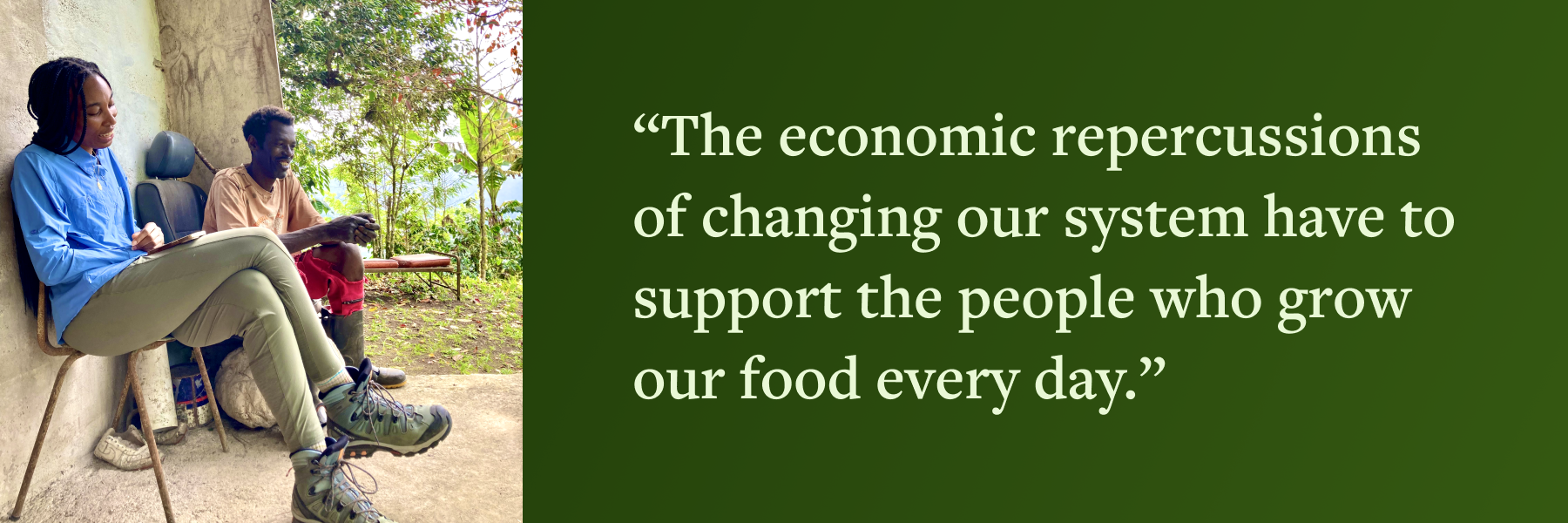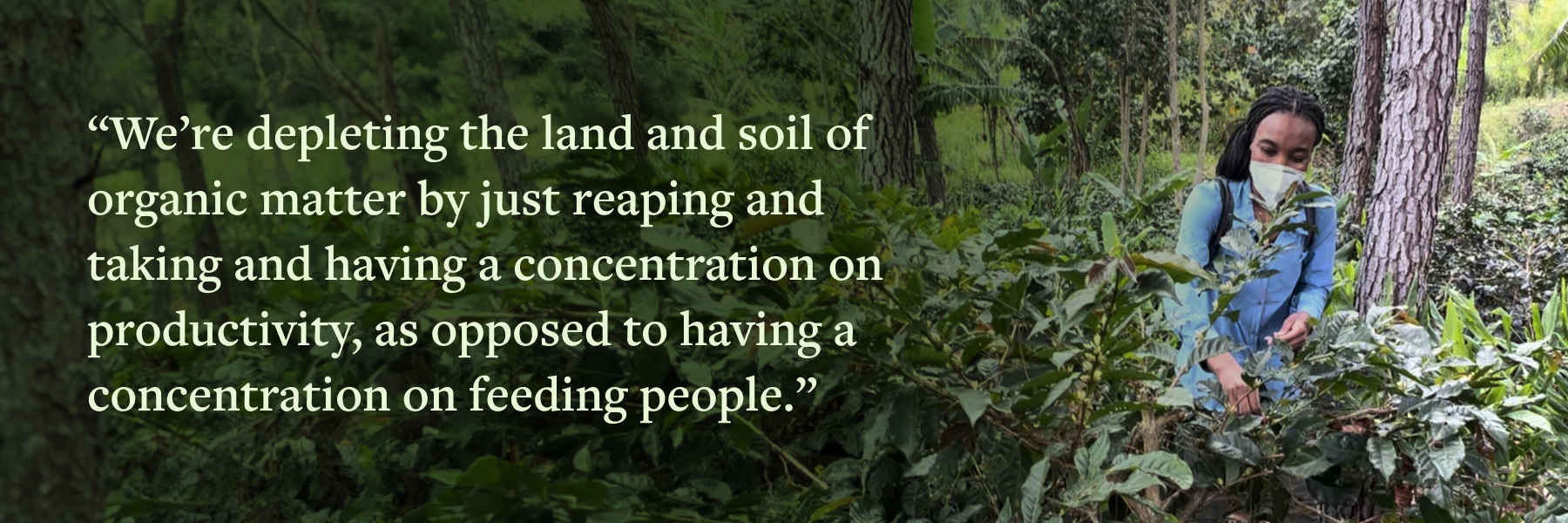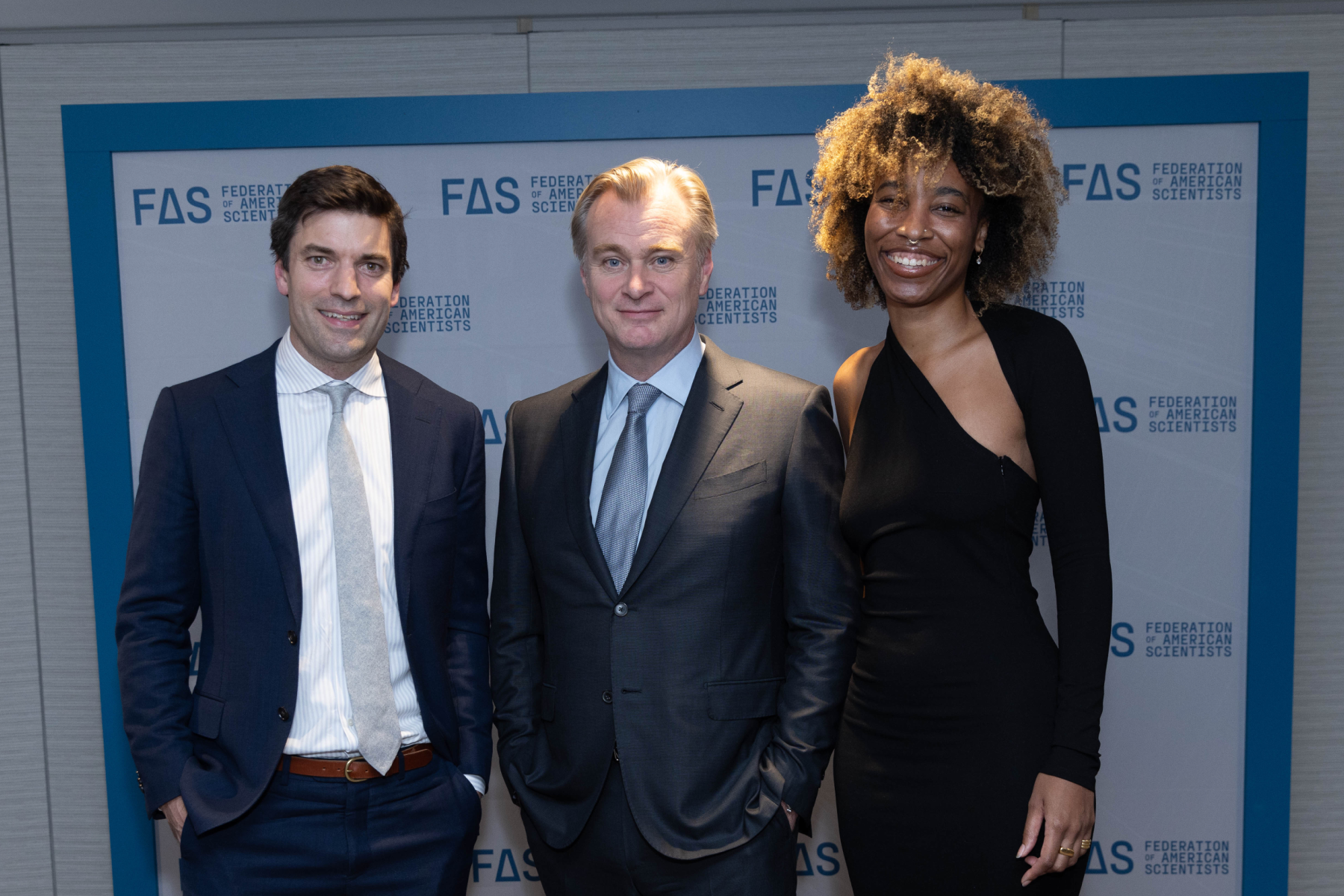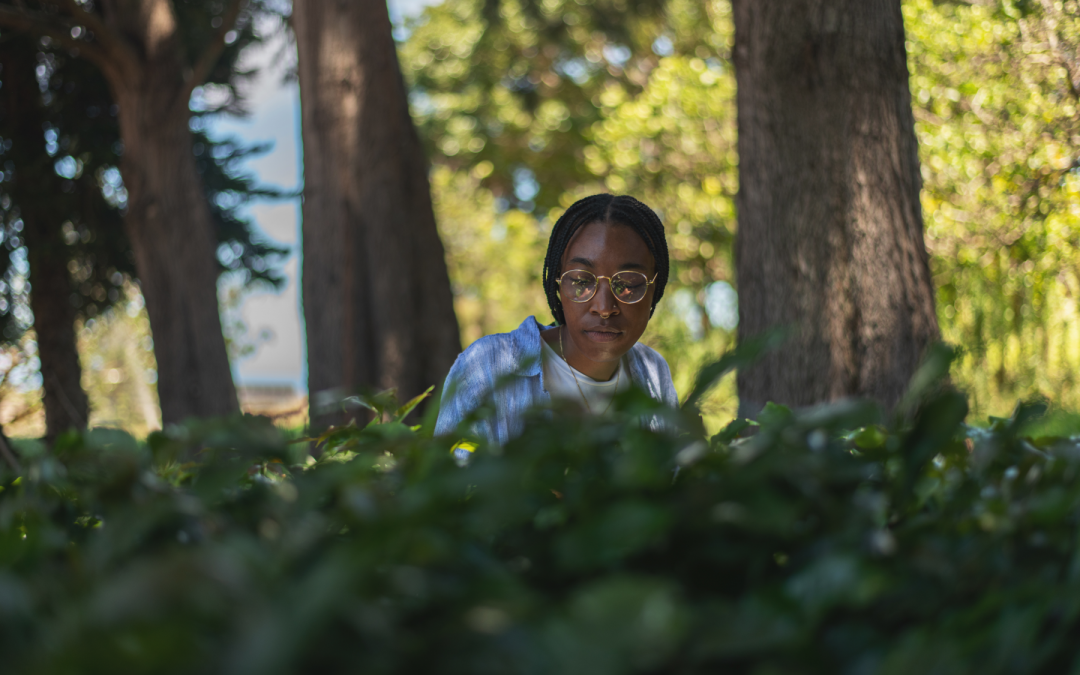Alexa White studies sustainable agriculture in connection with a broader focus on environmental justice. What sustainable agriculture means to people from different parts of the world—and from different socioeconomic strata—is the focus of her dissertation work as a Ph.D. candidate in ecology and evolutionary biology. What environmental justice means to her is, “the right and autonomy for individuals to have access to fresh food, water, and basic human resources without being disenfranchised or oppressed.”
An example she often brings up that captures elements of both these concepts revolves around a simple question: If you live in New York City and it’s January, how are you able to get a mango from the supermarket?
“That mango had to come from probably someplace near the equator,” she says. “Someone had to grow it in mass quantities, because it’s something that’s supposed to be available year round. It got packaged in plastic and shipped to you and put into your supermarket.
“And with agriculture, everything has a cost. That mango might cost a dollar, but that cost is paid for throughout the supply chain, because it’s outsourced to a community where people don’t have the power or the resources to ask for an appropriate wage, and they don’t have the power to not work with dangerous chemicals and carcinogens. The economic repercussions of changing that system have to support the people who grow our food every day.”

“World Hunger Should Not Exist”
White, who is training as an agroecologist, believes that small scale farmers deal with climate change impacts differently than large scale farmers do, and that differences exist between “how the global north, or more financially secure nations, view sustainable agriculture and how less financially secure nations of the global south view it.” To investigate her hypothesis, she looks at biophysical indicators—things like soil moisture, organic matter in soil, and tree cover—to determine specific metrics of what sustainable agriculture means for each nation. And she also talks to the people working the land.
“I do my work in Jamaica and Hawaii, and I’m specifically focusing on the United Nations Sustainable Development Goal Number Two: to end hunger. I interview farmers and ask them questions about what they think about sustainable agriculture on both small and large farms in those places, and I’m doing a comparative study.”
White notes that we are living in an era known as the industrial food regime, which is characterized by clearing land for large, homogenized crops that rely on heavy use of fertilizers and chemicals to promote growth and keep pests at bay. Outside of the dangers of these chemicals leaching into the soil and groundwater, White says this approach takes a larger toll.
“When you create land for agriculture in a very industrial way, you are basically getting rid of the only thing that can suck out carbon from the atmosphere,” she says. “We’re depleting the land and soil of organic matter by just reaping and taking and having a concentration on productivity, as opposed to having a concentration on feeding people. Plenty of papers have stated that world hunger should not exist, but it persists. So it’s a question of distribution—it’s not a question of production.”

Equity Through Expertise
Environmental justice held a strong appeal for White, a New Jersey native who was introduced to the field while doing undergraduate work at Howard University and being mentored by Beverly Wright, the founder of the Deep South Center for Environmental Justice. Under Wright’s guidance, White attended the Conference of Parties (COP) 21 in Paris in 2015. That conference gave rise to the landmark Paris Agreement, a legally binding international treaty on climate change. It planted the seeds for another effort, as well.
“That was the first time where we got to see the international scale of what environmental justice meant and how it connected to us,” White says. “And two of us out of that group decided that we wanted to make something that was more substantial and have a legacy.”
In partnership with Adria Peterkin, a Ph.D. student in the Department of Nuclear Science and Engineering at the Massachusetts Institute of Technology, White co-founded a think tank called the Aya Research Institute two years ago. The mission of Aya is to increase the number of scientists and engineers of color who are involved in environmental justice research and eventually to influence federal, state, and municipal policy. At the root of that work is helping to enhance the data being used to identify and respond to environmental justice issues.
“We think that there should be a lot more focus on ethical data and how we are getting that data and who’s controlling that data,” says White, who also has served as co-director of the student-led Climate Blue at U-M. “The space that Aya fills is having that participatory action research, where the scientists who are developing these tools and tweaking it are actually involved with small, grassroots organizations. And these scientists are also of color, so they can take in different biases that other data sets might ignore.”

White was honored in November 2023 with the Federation of American Scientists’ inaugural Policy Entrepreneurship Award. From left: federation CEO Daniel Correa, film director Christopher Nolan, and White.
White has received significant recognition for her efforts thus far. In 2020, she received the World Wildlife Fund’s Conservation Leadership Award for “her research and profound discoveries in food sovereignty and food justice.” Last November, she became the first ever recipient of the Federation of American Scientists’ Policy Entrepreneurship Award at a ceremony where other awardees included filmmaker Christopher Nolan, U.S. Senators Chuck Schumer and Todd Young, and acclaimed scholar Alondra Nelson. After graduation, White says she ultimately wants to seek a position like a professorship, the commissioner of the Environmental Protection Agency, or a leadership role at the United Nations Educational, Scientific, and Cultural Organization. But she hopes her work with Aya will be a lifelong endeavor.
The name Aya refers to a West African Adinkra symbol that represents endurance and resourcefulness, qualities essential to any effort aimed at improving the relationship between our food, our lives, and our planet. This summer, the institute will launch a fellowship program in which three fellows will live and work within communities for four months and develop a project with a specific environmental justice organization. They will also produce two papers on their work, one academic and one geared toward a popular audience.
“I think that there’s a lot of power in scientists learning how to communicate with the public,” White says. “Oftentimes when scientists communicate, they aren’t really trained on what the public would need to hear or how to relay that information. I feel as though a lot of the opposers of climate change take advantage of that gap. And I personally think it’s important to be in spaces where people disagree with you. That’s the only way that change will happen.”
How Rackham Helps
White says that Rackham Research Grants have helped fund her travel to Jamaica and Hawaii.
“Rackham has also helped in terms of my perspective on having international conversations and what it means to define a community that’s disadvantaged,” she says. “Through my work as a GSSA for the Minority Serving Institutions initiative, it’s really cool to see how this microcosm of individuals trying to create more equitable spaces can be used on an international scale. It’s really helpful to compare the two.”

